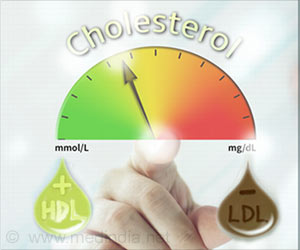A new study has found that an abnormal brain cholesterol metabolism may be behind the mental decline seen in Alzheimer's patients.
A new study has found that an abnormal brain cholesterol metabolism may be behind the mental decline seen in Alzheimer's patients. So far, the cause behind Alzheimer’s has been unclear, while the sticky protein amyloid-beta (A-beta) is largely considered to trigger the disease.
Now, researchers at Washington University School of Medicine in St. Louis have found a connection between early- and late-onset Alzheimer's - brain cholesterol metabolism."Our research links two major determinants for early- and late-onset Alzheimer's disease," says senior author Guojun Bu, Ph.D., professor of pediatrics and of cell biology and physiology. "And we've shown that the process that links them is implicated in brain cholesterol metabolism,” Bu added.
The report follows closely on another study reporting that statins, widely prescribed cholesterol-lowering drugs, could prevent certain neural changes that signal the progression of Alzheimer's disease. Additional earlier studies support the idea that statins could benefit Alzheimer's patients; however, other studies have found no such protective effect from statins.
"The studies of statins and Alzheimer's have generated quite a bit of controversy. Those that show positive effects from statins seem to suggest that high cholesterol could increase the risk of Alzheimer's disease. But other evidence contradicts this idea,” Bu said.
In the current study, the team found an aspect of cholesterol transport and metabolism in the brain was a link between early- and late-onset Alzheimer's disease. Both forms of the disease result in similar brain lesions and have the same symptoms, including difficulties communicating, learning, thinking and reasoning, which suggest they share underlying mechanisms. But until now, no one has been able to identify such a mechanism.
Early-onset Alzheimer's can be traced to mutations in one of three genes, and the gene coding for A-beta's precursor, APP, is one of these. People with mutations in APP nearly always develop Alzheimer's disease, usually at a relatively young age.
Bu and colleagues demonstrated that APP and apolipoprotein E have a molecular connection. When APP is cleaved by a specific enzyme in the brain, it releases A-beta plus a small protein fragment. The fragment then can regulate apolipoprotein E, which moves cholesterol in the brain from support cells to neurons.
"Cholesterol metabolism in the brain is an understudied area, and our findings could inspire Alzheimer's researchers to look further into the role of the cholesterol pathway," Bu said. "Right now, research on Alzheimer's treatment focuses largely on reducing A-beta production or increasing its clearance from the brain. Our study suggests that there could be an alternate way to treat the disease, perhaps by modulating the function of apolipoprotein E and cholesterol in the brain,” Bu said.
Bu and his colleagues plan to screen for compounds that regulate the molecular components that they found to be involved in cholesterol metabolism. They hypothesize that such compounds could work to enhance the brain's cholesterol metabolism and alleviate Alzheimer's symptoms.
Source-ANI
LIN /J
 MEDINDIA
MEDINDIA
 Email
Email










